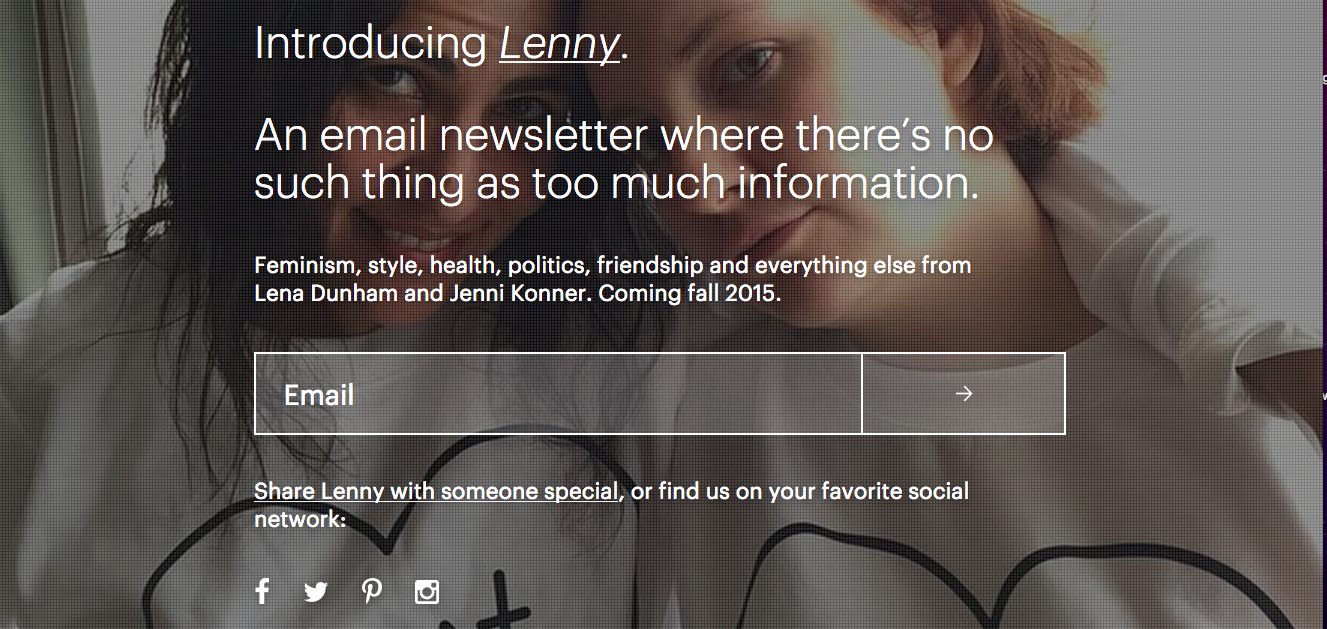Media
Email Always Wins: Why Lena Dunham Is Launching a Newsletter
Lena Dunham has something to say to young women, and she’s made a very deliberate choice about where to reach them: in their inboxes.
That’s why she’s teaming up with Girls Executive Producer Jenni Konner to launch Lenny, “an email newsletter where there’s no such thing as too much information.” According to the sign-up page, Lenny will cover topics of “feminism, style, health, politics, friendship, and everything else.”
As a media brand in her own right, Dunham has no shortage of channels through which to communicate with her target audience of 18- to 34-year-old women. She’s already made her voice heard through her Emmy Award-winning HBO series, best-selling book, and social media accounts.
So why email, why now, and why should brands care?
As New York magazine reports, Dunham came up with the idea for Lenny while on tour promoting her book, Not That Kind of Girl. Based on the questions she was asked, she realized that millennial women were hungry for conversation about everything from political hot topics to everyday beauty tips.
Dunham could’ve opted to launch a blog or website, like Tavi Gevinson’s Rookie, Zooey Deschanel’s HelloGiggles, or Gwyneth Paltrow’s Goop. These comparisons aren’t lost on Dunham’s team. Lenny’s editor-in-chief, Jessica Grose, calls Lenny, “Rookie’s Big Sister or Goop meets Grantland.”
In the end, Dunham ditched the blog idea and chose a different route.
“Dunham and Konner saw a newsletter as the ideal incarnation of that editorial space: a place where they could expand beyond Twitter’s character limit but also not feel burdened by daily updates,” Jessica Roy writes for New York.
For brands still figuring out how their content and email marketing strategies fit together, Dunham’s choice should spark some ideas.
Email offers direct access to audiences as well as complete control over how they’re consuming your content, where they’re being reached, and when they see it. And this hyper-targeting works. According to Direct Marketing Association, 66 percent of online consumers made a purchase as a result of an email marketing message in 2013. Emarketer also reports that in 2014, marketers considered email marketing to be the most effective strategy for customer retention.
As BuzzFeed reports, Lenny is currently self-funded, but will gradually establish revenue streams through select advertisers. More specifically, Konner says they’ll be incorporating “e-commerce that collaborates with independent female artists and designers in ethical, affordable, and witty apparel and design items.”
Once advertisers are on board, Dunham’s newsletter will also be an interesting case study for influencer marketing. Brands are already partnering with YouTube stars and Instagram gurus to get their products out to new audiences, but what about celebrities who are communicating with huge fan bases via email?
Advertisers would be wise to experiment with this concept, considering 92 percent of consumers trust recommendations from other people—including celebrities—over promotional content that comes directly from brands. Not to mention, a whopping 91 percent of women feel misunderstood by advertisers. As the newsletter develops, Dunham will be banking on the idea that she understands these women, and that she can prove it to advertisers.
Regardless of any monetary ROI that might come from Lenny, the newsletter will provide a unique look at how email doesn’t just have to be a tool for distributing content hosted elsewhere. It can also be its own curated publication, full of high-quality content that’s carefully designed for a specific readership.
To help make this happen, Dunham and Konner handpicked a team of storied editors and writers. Joining Grose (formerly of Jezebel and Slate) is associate editor Laia Garcia (current Rookie writer) and editor-at-large Doreen St. Félix (Pitchfork, The Hairpin, BuzzFeed).
So, why now? Judging from the text in Lenny’s introductory email, one of Dunham’s motivations for launching the site is political:
“…we want to entertain and inform you, but we also want to make the world better for women and the people who love them. That means keeping abortion safe and legal, keeping birth control in your pocket and getting the right people elected, all while wearing extremely fierce jumpsuits.”
If Dunham’s editorial model proves successful, it could spark a whole new digital publishing trend—one without page views, comments sections, or bounce rates.
I’m at the risk of getting carried away, so I’ll end with a quote from Dunham’s Girls alter ego, Hannah Horvath:
“I don’t want to freak you out, but I think that I may be the voice of my generation—or at least a voice of a generation.”
Dunham’s email newsletter might not be the publishing move of her generation. But it will be a publishing move of a generation. And certainly one that brands should keep an eye on.
Image by John Salangsang/AP ImagesGet better at your job right now.
Read our monthly newsletter to master content marketing. It’s made for marketers, creators, and everyone in between.





